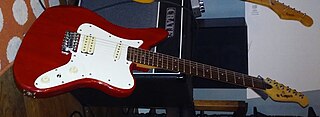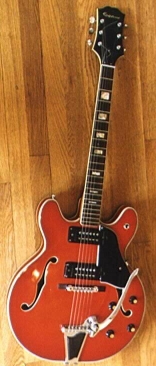Ibanez is a Japanese guitar brand owned by Hoshino Gakki. Based in Nagoya, Aichi, Japan, Hoshino Gakki were one of the first Japanese musical instrument companies to gain a significant foothold in import guitar sales in the United States and Europe, as well as the first brand of guitars to mass-produce seven-string and eight-string guitars. Ibanez manufactures effects, accessories, amps, and instruments in Japan, China, Indonesia, and the United States. As of 2017 they marketed nearly 165 models of bass guitar, 130 acoustic guitars, and more than 300 electric guitars. After Gibson and Fender, Ibanez is considered the third biggest guitar brand.

The Gibson Les Paul is a solid body electric guitar that was first sold by the Gibson Guitar Corporation in 1952. The guitar was designed by factory manager John Huis and his team with input from and endorsement by guitarist Les Paul. Its typical design features a solid mahogany body with a carved maple top and a single cutaway, a mahogany set-in neck with a rosewood fretboard, two pickups with independent volume and tone controls, and a stoptail bridge, although variants exist.

Epiphone is an American musical instrument brand that traces its roots to a musical instrument manufacturing business founded in 1873 by Anastasios Stathopoulos in İzmir, Ottoman Empire, and moved to New York City in 1908. After taking over his father's business, Epaminondas Stathopoulos named the company "Epiphone" as a combination of his own nickname "Epi" and the suffix "-phone" in 1928, the same year it began making guitars. From the 1930s through to the early 1950s, Epiphone produced a range of both acoustic and (later) electrified archtop guitars that rivalled those produced by Gibson and were the instruments of choice of many professionals; a smaller range of flat-top guitars were also produced, some designations of which were later continued during the Gibson-owned era for the company.
Univox was a musical instrument brand of Unicord from the early 1960s, when they purchased the Amplifier Corporation of America of Westbury, New York, and began to market a line of guitar amplifiers. Univox also distributed guitars by Matsumoku, effects units by Shin-Ei Companion, and synthesizers by Crumar and Korg.

The Gibson Explorer is a type of electric guitar model by Gibson guitars, released in 1958. The Explorer offered a radical, "futuristic" body design, much like its siblings: the Flying V, which was released the same year, and the Moderne, which was designed in 1957 but not released until 1982. The Explorer was the final development of a prototype design that, years later, Gibson marketed under the name Futura.

A headstock or peghead is part of a guitar or similar stringed instruments such as a lute, mandolin, banjo, ukulele and others of the lute lineage. The main function of a headstock is to house the tuning pegs or other mechanism that holds the strings at the "head" of the instrument; it corresponds to a pegbox in the violin family. At the "tail" of the instrument the strings are usually held by a tailpiece or bridge. Machine heads on the headstock are commonly used to tune the instrument by adjusting the tension of strings and, consequently, the pitch of sound they produce.

Kramer Guitars is an American manufacturer of electric guitars and basses. Kramer produced aluminum-necked electric guitars and basses in the 1970s and wooden-necked guitars catering to hard rock and heavy metal musicians in the 1980s; Kramer is currently a division of Gibson Guitar Corporation.

Orville by Gibson (オービルbyギブソン) or Orville (オービル) was a brand of guitars that was managed by the Gibson Guitar Corporation for the Japanese market during the late 1980s and most of the 1990s. The name is borrowed from Orville Gibson, who founded Gibson in 1902.
Matsumoku Industrial was a Japanese manufacturing company based in Matsumoto, Nagano, between 1951 and 1987. Established in 1951 as a woodworking and cabinetry firm, Matsumoku is remembered as a manufacturer of guitars and bass guitars, including some Epiphone and Aria guitars.

Greco is a Japanese guitar brand owned by the Kanda Shokai Corporation (in Japanese) 神田商会, a musical instrument wholesaler mostly known for being part of Fender Japan. Instruments manufactured with the name "Greco" are electric and acoustic guitars.

Aria Guitars Co. is a Japanese manufacturer of musical instruments. The company, sited in the city of Nagoya, produces electric, acoustic and classical guitars, electric basses and ukuleles through its brands Laule'A, Mojo Gig Bags, Fiesta, José Antonio, Pignose and Kelii.
Hoshino Gakki Co., Ltd. is a Japanese manufacturer of musical instruments. It is the owner of the Ibanez guitar and Tama drum brand names.

The Epiphone Texan is an acoustic flattop guitar of the (advanced) Jumbo type. Recent models have an integrated light-weight internal electric pickup fitted; the original model was acoustic only.
The Epiphone Sheraton is a thinline semi-hollow body electric guitar. Though the Sheraton and all its variations were introduced under the ownership of the Gibson Guitar Corporation, Epiphone is the exclusive manufacturer.

Lotus was a house brand belonging to Midco International of Illinois. The brand was applied to guitars, basses, banjos, and mandolins made in various Asian factories from the late 1970s until the early 2000s. Lotus guitars were usually copies of better-known, up-market brand-name guitars, such as the Gibson Les Paul and the Fender Stratocaster.

An archtop electric guitar manufactured by Matsumoku and sold 1970 to 1974 or '75 in the United States under the Epiphone brand. Matsumoku also manufactured the nearly identical Univox Coily guitar and several related guitars sold under the Univox brand.
Penco was a brand of guitars owned and manufactured by the Hoshino Gakki Co. in its factory of Nagoya, Japan. Ibanez guitars was another brand owned and manufactured by Hoshino Gakki. In the United States, Penco guitars were distributed by the Philadelphia Music Company.

Gibson, Inc. is an American manufacturer of guitars, other musical instruments, and professional audio equipment from Kalamazoo, Michigan, and now based in Nashville, Tennessee.

Chicago Musical Instruments Co. (CMI), later known as Norlin Music, was a manufacturer and distributor of musical instruments, accessories, and equipment, which at times had controlling interests in Gibson Guitars, Standel, Lowrey, F. E. Olds & Son, William Lewis & Son Co., Krauth & Beninghoften, L.D. Heater Music Company, Epiphone Guitars, Selmer UK, Moog, and other musical instrument brands. In the mid-1970s, the company was the largest manufacturer of musical instruments in the United States.












